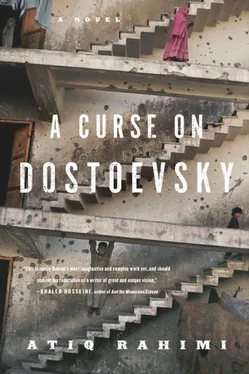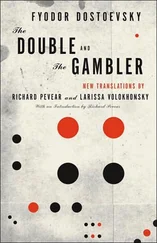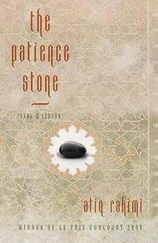“Right, you’re coming to the police station with us!” They take him, along with a few Russian books as evidence.
As he passes Yarmohamad, Rassoul stares at him, to indicate that he will be paying dearly for this cowardice. He hears him mutter: “Razmodin’s going to fuck you up too, for these damned books!”
There’s no way these two guys have come round to my place at this time of night to beat me up on account of my books. Someone must have tipped them off about the murder of the old woman. It’s all over! The woman in the sky-blue chador, that’s who it was. She’s finished me. But I’m going to tell, too. I’m going to turn her in as my accomplice. She has no right to live in peace, not sharing my crime and my punishment!
HAVE I fallen asleep again?
And this silence—broken from time to time by the sound of whisperings, muffled footsteps, stifled cries—am I dreaming it?
Open your eyes, and you’ll know.
He quickly opens his eyes, but a white light blinds him. He shuts them again and opens them gently. Still the same light. He listens. Still the same sounds. So it isn’t a dream?
No. Of that, he can be sure. The bright light, the white walls, the stifled cries all make him feel as if he’s in a hospital… Except that he isn’t in a white bed. He’s lying almost flat on an old leather sofa, with a hole in his memory that he tries to repair with the images and sounds that bombard him: the two men attacking him in his bedroom; the door of the “Ministry of Information and Culture”; the blinding beam of light from the guard who stopped them; the two men leading him up the stairs; the shooting pain in his ankle; a long corridor lit by dim bulbs with young, wounded men dozing in corners while others smoked on chairs or decrepit old sofas; further on more men, sitting on the floor around a tablecloth, eating bread and cheese; even further, three or four men cleaning ancient Russian guns; an old man reciting the Koran; another cooking on a portable stove, filling the room with an oily, spicy smell… Rassoul is suddenly filled with a strange and distressing sensation, as if he has experienced this scene before. As if he has always been walking up and down this endless corridor under the intent and suspicious gazes of these men. He passes out. Everything goes black.
Now he is here, sitting opposite a most serious-looking man behind a large desk, who is leafing through his Russian books and reading the papers he finds inside them; behind him, the two bearded guards who brought him here.
Rassoul sits up, attracting the attention of the man behind the desk. He seems calm, with a pakol on his head and a pointy, weather-beaten face and neatly trimmed beard. He stops reading and asks Rassoul with a slight smile: “Where are you from, watandar ?”
Watandar —now there’s a comforting word, a pretty expression almost forgotten since the start of this fratricidal war. These days, people don’t tend to call anyone “countryman” unless they’re on the same side. Nothing to fear, then!
And in fact, there isn’t anything to fear. I will sit nicely on this sofa, and reply most calmly that I am from Kabul.
His lips move. The name of his hometown is just a breath, muffled, inaudible. ‘I can’t hear you,’ says the man, leaning over the desk.
Has he already forgotten that his voice doesn’t work?
An internal cough to clear his throat, but still not the slightest sound.
Horrified, he starts waving his hands, gesturing, pointing to his Adam’s apple, grabbing it between his fingers, just to demonstrate that he is unable to speak. “Are you mute?” No, he gestures. “Can you hear me?” Yes. “Are you ill?” Mmm, yes.
The man leans back in his chair and stares at Rassoul suspiciously for a while, then asks: “Which side are you on?”
“None!” breathes Rassoul, but the word is imprisoned in his vocal cords, and his hands flap about all over the place to communicate the word. The man stands up and holds out a pencil, which he takes to write: None . The man reads it. Then he stares at Rassoul again, probably asking himself how it is possible to live in this war-torn land without belonging to any side.
“What tribe are you from?”
Rassoul scribbles: Born in Kabul . That is all. The man doesn’t seem convinced.
“Where did you learn Russian?”
Rassoul writes: I was a student in Russia . The man reads his response aloud, then asks: “And what were you studying?”
Law , writes Rassoul, adding, after a short hesitation: And to read this damned Dostoevsky!
The man reads, laughs, and asks: “Why damned Dostoevsky?” Rassoul shrugs wearily, and points to his bloodstained shirt.
“These two watandars are illiterate. For them all Russian books are bound to be propaganda,” the man says.
It’s OK, Rassoul, you have been saved. This man understands you. You mustn’t miss this chance to find out more about why you were arrested. But where to start? Has he read Dostoevsky?
He writes it down. The man reads and replies: “Yes, I read his books when I was a student, in Persian of course. I was studying at the polytechnic. But after the 1981 protests against the Soviet invasion, I abandoned my studies to join the mujahideen. And you—were you in the… Komsomol?” He is shrewd, shrewder than he looks. He won’t let himself be interrogated by a young Kabuli like you. Don’t play with him. Right now, your life is in his hands. He can destroy you with a single breath. Don’t be arrogant. Present your life simply and humbly: you spent a few years in Russia, in Leningrad… No, better call it Saint Petersburg. Speak about your setbacks, the conflict with your communist father who sent you to study in the USSR against your will. You only stayed three years, from ’86 to ’89. Over there, you knew a girl whom you called Kissenka , poppet. No, don’t mention the love affair with a Russian girl. This mujahideen wouldn’t approve of that kind of thing with an unbeliever. Just write that you met a Dostoevsky scholar who gave you an initial book, Crime and Punishment , which changed your life. You gave it all up…
No! That’s far too long to write. You have to be concise, precise.
He starts describing his life, but has barely written the first sentence when he is interrupted by the man’s rich and thoughtful voice. He is reading aloud from one of the handwritten pages—Rassoul’s translated passages from Crime and Punishment —and stops to say that he read The Devils a long time ago, but not this book. Rassoul leaps up and rummages through his papers to find his translation of the back cover of Crime and Punishment . He finds it and gives it to the man, who takes it and reads into his beard: “The founding act of the novel is the student Raskolnikov’s murder of an old moneylender, in her flat in Saint Petersburg. Raskolnikov’s reflection on the motive for his crime, plus the influence of Sonia or a mysterious inner impulse, leads him to hand himself in and freely agree to punishment. It is during his years of hard labor that he becomes aware of his love for Sonia, and the path to redemption.” He nods his head in admiration, then says out loud: “An excellent lesson for murderers.” Rassoul bites his lips, these lips that move in vain, unable to express the thousand things he has to say about the book. He would like to explain, for the hundredth time, the motives of that murder: it was not only for robbery—to Raskolnikov, the moneylender is an evil beast who steals from people in desperate straits, and therefore killing her is an act of justice; by doing it, Raskolnikov claims his membership of a race of superior beings who exist “beyond good and evil”; for him, his murder is the supreme transgression of the moral and social code, and strikes a blow for independence and freedom, like all the great men in history—Mohammed, Napoleon…
Читать дальше












